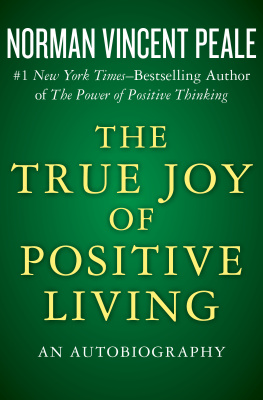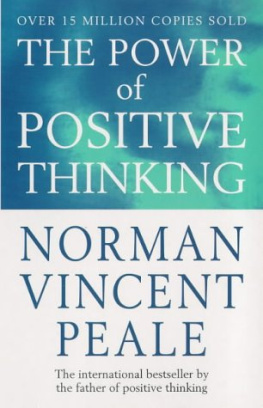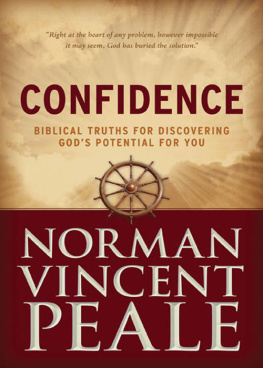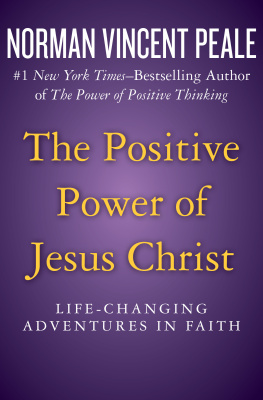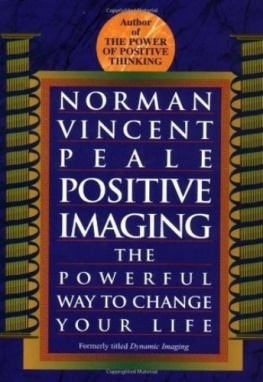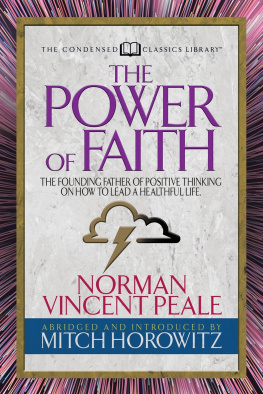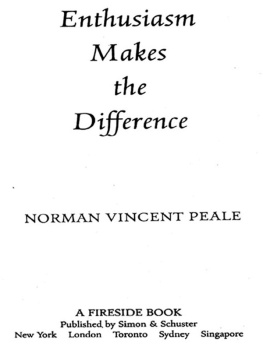The True Joy of Positive Living
An Autobiography
Norman Vincent Peale

This is the true joy in life,
the being used for a purpose
recognized by yourself as a mighty one
G EORGE B ERNARD S HAW
To my wife,
Ruth Stafford Peale,
partner in all our many activities,
with love, admiration, and gratitude
Contents
CHAPTER ONE
Country Boy from Ohio
Many people were surprised when I ended up a preacher, although I never got into too much devilment and was not what might be called a bad kid. In the small Ohio towns of the early 1900s, a preachers kid was considered different and made to feel so. Every little thing he did that was a bit out of line marked him as a sinner. Preachers kids reputations generally were suspect.
But several influences conspired to make a minister out of an unlikely prospect for that profession. One was Fathers preaching. The way he described Jesus Christ gave me, early in life, a profound admiration and enthusiasm for the Master. He had an incomparable way of making Christianity real and very exciting. He was a fascinating public speaker. I had enormous respect and affection for Father and always liked to hear him preach. So I was a regular churchgoer.
One summer Sunday in my boyhood, my mother was teaching a Sunday School class in the little Methodist church in Lynchburg, Ohio. Mother started out by commenting on the current status of the Cincinnati Reds, our baseball heroes. Then she launched into a description of Jesus, how He set his face to go to Jerusalem, knowing very well what would happen to Him. What a man. What courage. Mother called it guts. But He resolutely walked straight into the camp of His enemies because He loved me and was willing to die for me. That belief gripped me for life. It made me love Him forever. To me there has never been anyone like Him.
Although I tucked up this love and admiration for Jesus against my heart, had an accompanying love for the old hymns, liked to hear a good preacher, and was a believer, still I was what they called not in the Kingdom. I was a vital, virile boy and attracted by the fleshpots, though I never did quite find out what they were all about.
I knew that my mother always wanted me to become a preacher. Father never pushed that idea, saying that I should learn from God what He wanted me to do in life and follow the divine will and guidance. Though I was drawn toward the ministry, I resisted it because, as a preachers son in those small Ohio communities, I always seemed to be set apart as someone different from the other kids. If I did the slightest thing, like smoking corn silk behind the barn with the others, some would jeer: Oh, youre a preachers kid. This galled me, as it similarly troubled other sons and daughters of ministers, but such youthful trauma usually vanished as maturity advanced. However, I knew some ministers children resented this attitude toward them so deeply that they repudiated the church altogether, though retaining personal veneration for their parents.
In one Ohio town we lived in, every Monday morning my father would go to the bank and the president would give him his salary check for the week. The banker would expect him to deposit the check forthwith in his bank. As he handed the check to Father, he would always ask, Now, Brother Peale, do you think your sermon yesterday justifies this check?
This riled me no end, for I usually accompanied Dad on this Monday morning ritual. But Father was urbane and responded in kind to this so-called witticism. It amazed me that my father and the banker were friends; I even found later that they actually loved and respected each other.
The banker lived in a big house down Main Street. It was set back, regally, among old trees, and a curving drive swept up to the door. Every morning a driver would take him in a spanking, shiny carriage, drawn by two beautiful black horses, down to the bank and back for lunch, and down and back in the afternoon. All as if he were some Roman conqueror; or at least that is how I resentfully thought of it. Who was this big shot to whom the servant of Almighty God had to come like a respectful suppliant?
But Father said, One needs to know all about an individual, or at least all you can know, before a proper judgment may be formed. Now take this banker. He is the son of a poor farmer, a father who could never make a go of his few rocky acres. The family was poorer than we are. That boy came into town one day years ago and went up and down the street looking for a job, any kind of job. Finally he was hired by this bank as a janitor. He swept out, washed the windows, dusted the desks, ran errands, cleaned the toilet, and he did each lowly chore with cheerfulness and to the best of his ability. Years came and went, and finally he became bank president.
He married a lovely girl and they lived together in happiness for twenty-five years or more. Then early one morning that team of horses and carriage you resent came to me and carried me to his big house where, for all his wealth and position, his lovely wife could not be saved. I was there when she died and sat with him in his grief. Ill never forget you and what you have done by being with me in the worst hour of my life, he said, gripping my hand at the door.
He has never spoken of it again, but it is his nature to conceal his feelings. But, you see, I know him and in his own way he loves me as one of his closest friends. So dont mind that we carry on that little ritual every Monday morning. Its just a way men have of showing the affection they have for each other.
Thereafter I saw the bank president as a man, rather than as a banker, which was what Father intended, Im sure. And for this man I began to have compassion. Apparently it reached him because the last time I saw him, he put his arm around my shoulder and said, Norman, you have a fine man for a father. Take good care of him always. So saying, he went back to his desk and waved me off. He had said all that he could. When some years later I heard of his death, I was saddened, but knew that a good man with clean hands had gone home to his Lord. To love people compassionately and to see the good in every man and woman was what my father taught his children by precept and example.
Then there is the lifetime memory of that Sunday night in winter when Father was holding the annual series of revival meetings in a little church in a small village in southern Ohio. In those days the two weeks of revival, with meetings every night, was the big event of the year in the country round about. There were no movies, no radio, no television to compete. The church had preeminence. It was not only the spiritual center but the entertainment center, the gathering place. And since Father was a powerful speaker, the church was always filled, and for the revival meetings it was standing room only.
In the little village, there was a man, Dave Henderson, a nice enough fellow when he was sober. But when drunk, he was by common consent a holy terror. His drinking was periodic and he would be very much in his cups for several days.
Dave was a big man with hands like hams and fists having the driving power of pistons, so said those who had felt their impact in fights. Ordinarily genial, with liquor in him Dave would pick a fight at the slightest provocation. He also had the reputation of being the champion local cusser, and was quite foul-mouthed. Some said he was a wife beater, but his dignified and cultured wife would never admit to anything of the sort.

